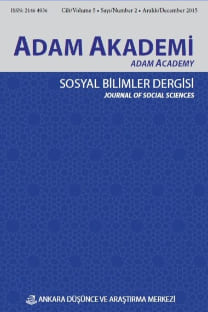İslam, Siyaset ve Bangladeş: Bangladeş Cemaat-i İslami (BJI) Demokratik ve Politik Kültürü Üzerine Nitel İçerik Analizi
Bu çalışma, Bangladeş Cemaat-i İslami’nin (BJI) siyasi kültürünü ve demokratik katılımını tarihsel bir perspektiften incelemeyi amaçlamaktadır. İlk olarak İslam’ın Bangladeş’te nasıl ortaya çıktığını ve İslam’ın siyasi alanda nasıl geliştiğini ve ülkedeki demokrasi ile olan ilişkisini inceler. Çalışma, BJI’ın Bangladeş’in sıradan insanlarına ulaşmak için siyasi hedeflerini, misyonunu ve vizyonunu nasıl kullandığını belirlemeye çalışmaktadır. Bu hedefe ulaşma sürecinde, çalışma aynı zamanda bu örgütün politikalarını, motivasyonlarını ve deneyimlerini tarihsel arenadan mevcut duruma kadar araştırmaktadır. Ayrıca, BJI’ın programlarını, güncel tartışmaları ve politika zorluklarını değerlendirmektedir. Çalışmada BJI’ın halk ile iletişimini ve siyasi faaliyetlerini incelerken, demokratik hareketteki rolüyle ilgili niteliksel bir analizi sunulmaktadır. Makale özellikle ulusal seçime odaklanmakta olup bu siyasi partinin amaçlarını ve algılarını anlamak için niteliksel bir yaklaşım benimsemektedir. Genel olarak, bu yazıda BJI’ın ile durumunu anlatmak için tanımlayıcı ve analitik metodoloji uygulanmıştır. Bu makale nitel içerik yöntemi bir analiz stratejisi olarak kullanılmaktadır.
Anahtar Kelimeler:
Nitel İçerik Analizi, Siyasi Kültür, Demokratik Katılım, İslami Hareket ve Bangladeş Cemaat-İ-İslami (BJI)
Islam, Politics and Bangladesh: A Qualitative Content Analysis on the Democratic and Political Culture of Bangladesh Jamaat-e-Islami (BJI)
This study attempts to explore the political culture and democratic participation of Bangladesh Jama’at-e-Islam (BJI) from a historical perspective. It first looks at how Islam came in Bangladesh and how Islam has evolved in the political sphere and its association with democracy in the country. The paper is keen to establish how BJI is using its political objectives, mission, and vision to reach the ordinary people of Bangladesh. In the process of achieving this objective, the study also investigates the policies, motives, and experiences of this organization from the historical arena to the current situation. It also assesses the programmes, contemporary controversies, and policy challenges of this organization. In examining the engagement and ongoing political activities of BJI, this study is providing an ethnographic analysis of Bangladesh Jama’at-e-Islam (BJI) with regard to its role in the democratic movement in the country. The paper particularly focuses on the national election and adopts a qualitative approach to understand the purposes and the perceptions of this political party. Overall, descriptive and analytical methodology has been applied in this paper to narrate the situation related to BJI. This paper utilizes the qualitative content method as a strategy of analysis.
Keywords:
Qualitative Content Analysis Political Culture, Democratic Participation, Islamic Movement, and Bangladesh Jamaat-e-Islami (BJI),
___
- Amin, Faroque. (2016). Social Welfare Program of Islamic Political Party: A Case Study of Bangladesh Jamat-e Islami. A PhD thesis submitted to the Religion and Society Research Centre, School of Social Science and Psychology, University of Western Sydney. Ali, Riaz. (1994). State, Class and Military Rule: Political Economy of Martial Law in Bangladesh. Dhaka: Nadi New Press, 116–63
- ISSN: 2146-4936
- Yayın Aralığı: Yıllık
- Başlangıç: 2011
- Yayıncı: Ankara Düşünce ve Araştırma Merkezi İktisadi İşletmesi
Sayıdaki Diğer Makaleler
Muhtarlar ve Topluluk-Temelli Afet Yönetişimi
Fahri ÇAKI, Goncagül GÜLTEKİN ÖZBAYRAM
Md Nazmul ISLAM, Murat ÖNDER, İ̇srael Nyaburi NYADERA
Özlem TÜRKÖZÜ, Merve KOÇOĞLU SAZKAYA
İç Savaşlar Ne Zaman Etnik Temizlik Doğurur? Lübnan ve Yugoslavya Vakaları
Koronavirüs Küresel Salgınının Risk Toplumu Bağlamında Tartışılması ve Eğitsel Sonuçları
Md Nazmul ISLAM, Murat ÖNDER, İsrael Nyaburi NYADERA
Aile İletişim Süreçlerinde Sosyal Medya Bağımlılığının Yansımaları
Şebnem GÜRSOY ULUSOY, Özge GÜRSOY ATAR
